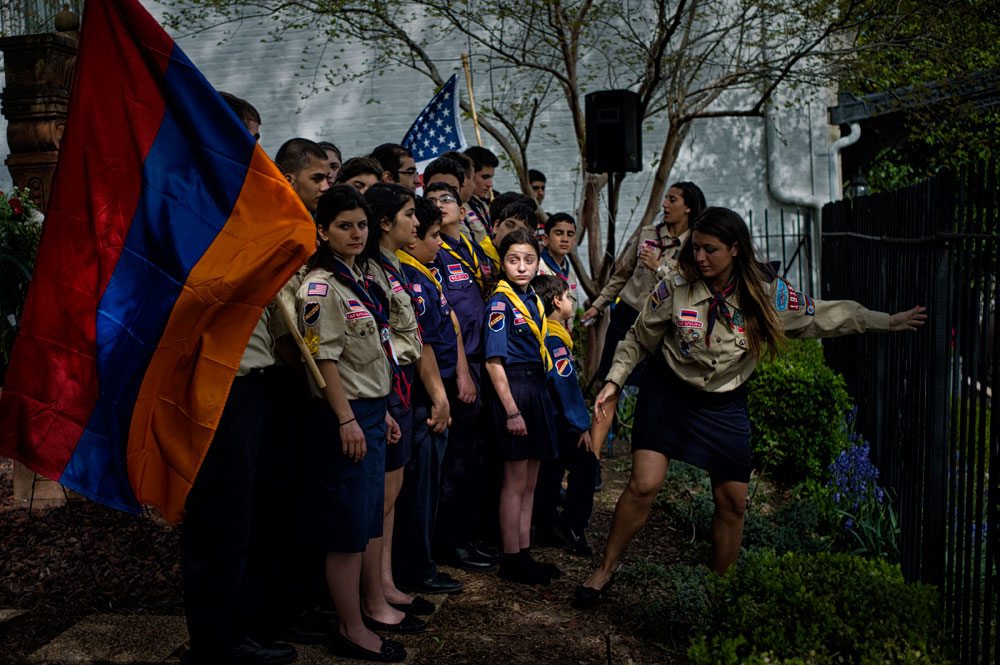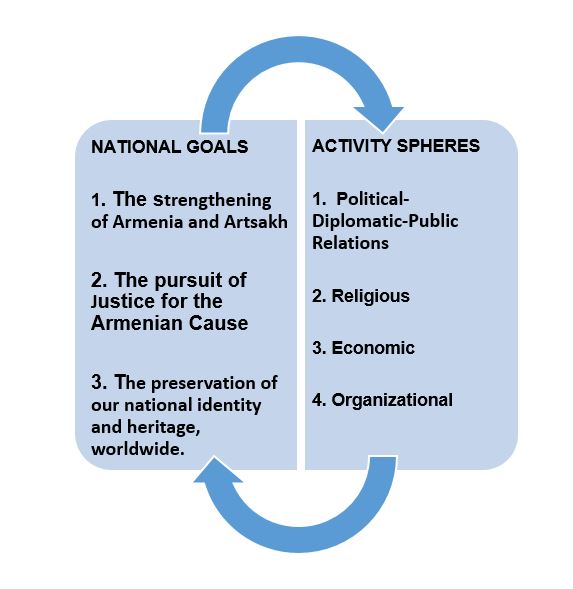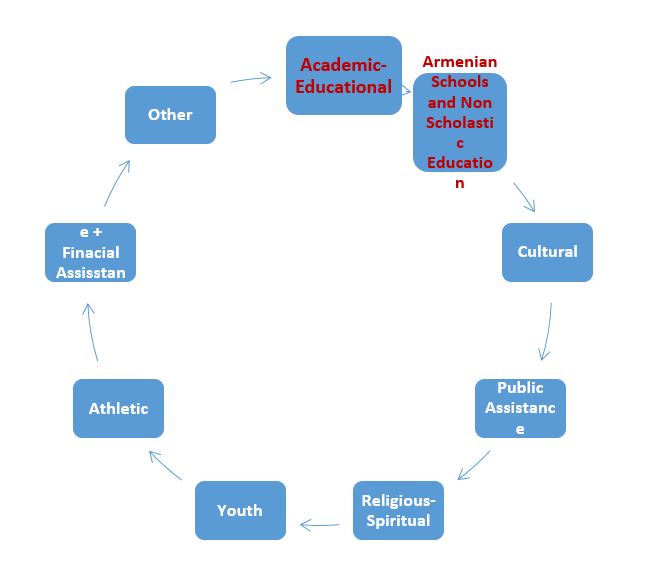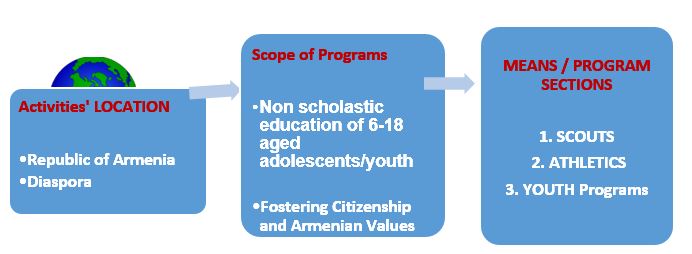Reassessing Strategic Priorities and Examining Homenetmen’s Role on the Brink of the Next Centenary
Often times we talk about the fact that we need a more conscious society, one that better values the importance of pan-Armenian priorities. If we ask ourselves how can we strengthen as a nation and a state, alongside a more demanding stance towards national priorities, we ought to mold and prepare more committed Armenian people. For a successful outcome of such a goal, we need several premises, most important of which include an adjustment in the implementation of national strategic plans, leadership succession planning and reinvigoration of the ranks and members of our institutions and organizations. And that requires a change in our collective thinking and action plans; it also requires a qualitative change in the educational standards of our youth, particularly those in the 6-18 age bracket.
Those of us, who live in the diaspora and belong to the baby boomer generation and generation X, should feel fortunate to have had the opportunity to be instructed by the finest Armenian educators and to have reaped the benefits of their mind and spirit. If our parents and schools were responsible for instilling within us the values of the Armenian language and identity, then it is the national educators within the triad of the party/association/organization and the church, who drove us to rise above our individual selves and realize the advantage of collective power, to embody the feeling of being a proud Armenian, and to strengthen the image of a committed Armenian.
Today’s Armenian reality differs. Challenges present themselves as more ominous and pressing, and today’s youth, millennials and generation Y, do not have the same fortune and opportunity of getting their education by such quality mentors as in the past. Therefore, in order for Armenian nation priorities to have a productive outcome, modern challenges require a reformed pan-Armenian strategy, at the very least in the organizational and educational spheres, within which Homenetmen also operates.
Our national imperative is first and foremost the strengthening of the Republic of Armenia, and, second, the strengthening of the diaspora. Our pan-national goals include the strengthening of Armenia and Artsakh, the pursuit of justice for the Armenian Cause, and the preservation of our national identity worldwide. Activities in pursuit of these goals fall within different spheres, including the religious, political-diplomatic-public relations, economic, organizational, and educational. The political-diplomatic sphere has been entrusted to the Armenian government, political parties, and the Armenian National Committee (ANC). Economic activities are the responsibilities of many, be it organizations and/or individuals. The organizational field is comprised of religious-spiritual, academic-educational, youth-oriented, athletic, cultural, public assistance, and charitable realms that complement each other. Different organizations and associations, as well as individuals, all have their scope of work.
Today, our national imperative is to create an improved political and social reality. The state, church, political parties, different organizations and institutions as well as individuals, all have their scope of work in the pursuit of that goal. The reality is that within the present imperative the importance and scope of scholastic and educational sphere is not fully appreciated and the potential of extracurricular education offered outside of Armenian schools has not yet been appraised.
For the above reasons and because of such social and political imperatives, an organization such as Homenetmen with the “athletic” label is deemed of secondary national importance. However, the truth is that Homenetmen does not serve any autonomous goals, rather it is driven by the same imperatives as that of the Armenian nation, namely the strengthening of the Armenian nation. Its philosophy is based on the same pan Armenian principles, and its activity scope falls under the organizational-educational sphere. Homenetmen is aware of its educational responsibilities and is highly aware of the importance of the academic-educational sphere. It is to be stressed that within the realm of academia-education, the role and effect of Armenian schools is unparalleled, yet the importance of Armenian education outside of the Armenian school through non scholastic extracurricular activities has yet to receive special emphasis and herein lies the role of Homenetmen.
What is then the real benefit of Homenetmen within the context of pan-Armenian objectives and from the perspective of community interests?
Let us start by clarifying what Homenetmen does in the homeland, the Republic of Armenia. As a nation, we face a number of points of contention, one of which is the diaspora-Armenia debate, namely to prioritize strengthening the Republic of Armenia or the diaspora? In this aspect, Homenetmen remains above this contention. As an organization, Homenetmen focuses on a pan-Armenian strategy. The organization’s activities pertaining to Armenia are not limited to visits to the homeland or financial contributions. As a structure, Homenetmen has had a presence in Armenia for 25 years with a membership comprised exclusively of young citizens of Armenia. Its mission in the Republic of Armenia is to create model citizens who believe in social justice and contribute to the country’s development.
Over the years, several thousands of young members have been part of the ranks of Homenetmen-HASK (National Scout Movement of Armenia) and endorsed the scouting and Homenetmen slogan and motto. By doing so, Homenetmen has been contributing to the preparation of a new generation of Armenians inhabiting Armenia, who are pure in character, are confident and engaged citizens, and who believe in the principles of social justice and elevating others alongside them. Unlike others, Homenetmen’s activities in Armenia are not limited to mere expressions or occasional homeland visits, rather as citizens, through an everyday presence in the country and the process of continuance. In this context, Homenetmen also remains above the second point of contention related to the diaspora-Armenia debate, which is that living in the diaspora is only temporary, that it is not enough just to be a good Armenian, rather, repatriation and standing in solidarity with the homeland is the true objective. Well, Homenetmen has already repatriated, protects its homeland, and believes in the unity of our nation. This significant fact has not been valued enough or exercised in our national strategy.
Alongside its work in Armenia, Homenetmen also has a long history of 99 years of action and activity in the diaspora. Today, while Homenetmen serves a respectable percentage of the Armenian population, yet it is only utilized minimally as a national structure. It is the largest or one of the largest Armenian organizations worldwide with over 26,000 members and 107 chapters that have a presence in over 25 countries. In the Western United States, it has 6,500 members and close to 5,000 of those members are under the age of 25.
Homenetmen receives respect; however, if the issue is examined through a national-strategic point of view, it is incomprehensible that its value is often described primarily as a means of instilling national pride. For example, it boasts national pride through athletic victories in Lebanon, and in community life thru the participation of scouts and marching bands show of force, during sports festivals and national-political, religious and cultural events. While such participation during national events is expected and commended by all, the question is whether Homenetmen’s strength and its potential as a collective structure is being sufficiently maximized, when it is limited to only participatory roles?
There is a system and strategy in place for leading the diaspora and diasporan communities. The ultimate goal of this strategy is strengthening the diaspora and consists, first, of preserving the Armenian identity in the diaspora and, second, awakening political consciousness among all generations. To achieve the latter implies maximizing the number of Armenians especially the youth with a sense of commitment, while at the same time connecting them to Armenian national life and objectives. The question is how is it possible to develop political consciousness, especially among the young masses, not only quantitatively but also qualitatively.
Day by day, newly formed structures run parallel to the above-mentioned system, usually with more narrow goals. Homenetmen acknowledges the value of all these structures, yet as an organization believes in the collective purpose and as a structure remains part of and aligned with the above-mentioned national system.
Having said so, one can pose the question: how many young Armenians above the age of 20 can the system mobilize, especially those who have been distant from an Armenian-filled atmosphere until then?
At the present time, for a considerable number of young Armenians, the national agenda is not the focus of everyday life. We must admit that, the “Armenianness” is hardly progressing, and if so only partially, throughout Europe, America, and even the Middle East. The network of home-school-church-community center that was the core of Armenian life in the past is becoming stagnant. According to well-known sources, excluding the Middle East, the entire number of students who attend Armenian schools does not surpass the 10,000 mark. In California, there are about 5,000 students, who attend Armenian schools, and over 50,000 who attend non-Armenian schools. Those statistics bring into light another national debate: Is it only through the instruction and teachings of the Armenian language that Armenian national identity is formed?
As a pan-Armenian organization, Homenetmen cannot remain passive in this debate, especially that as an organization its current programs and inherent potential are geared for collective national goals. More than any other organization, Homenetmen serves to provide Armenian education in the extracurricular field, namely outside of the school environment. Through the appeal of its structure, Homenetmen bears membership from Armenian youth attending both Armenian and non-Armenian schools. Currently, 60-65% of its members age 25 and under do not attend Armenian schools. As such, nearly 8,000 Armenian youth are exposed to the Armenian identity through Homenetmen. Which other organization can come close to matching these figures? While the vital role of Homenetmen in this aspect may not have been made clear, it is a reality nevertheless and a significant one.
In such a context, what is then the role of Homenetmen? In the Western diaspora, Homenetmen strives to maintain a balance between the Armenian upbringing and the host country environment and realities, all the while developing the model 21st century diasporan and citizen, who is proud of their native country and even more proud of its sense of belongingness to the Armenian nation. In the pursuit of this duality, the efforts to transform a neutral individual into becoming a committed Armenian, is a conscious strategy for Homenetmen. It is worth repeating that throughout everyday life in the diaspora, Homenetmen not only gives way to Armenian patriotism, spirit and culture, but strives to prepare exemplary Armenian youth from the ages of 6-18, whose connection and ties to the Armenian identity is done with conviction and through voluntary commitment. In this manner, Homenetmen prepares a future generation of active youth over the age 20, who have passed through the ranks of the organization, and are gifted with education in political awareness.
It is especially because of the above, that alongside the political, religious, and economic spheres, the organizational-educational realm in our national strategy must receive additional esteem and become more prioritized. The reality is that our institutions’ current strategic domain, where Armenian schools, Hamazkayin, the Armenian Relief Society (ARS), Homenetmen, youth groups, Hai Tahd, and others act separately, will no longer yield the same successful outcomes as in the past or achieve the ideal outcome. Quantitatively, membership numbers in numerous institutions have decreased and all have seen a considerable decline in quality and manpower. While the role of Armenian schools in the educational field is unrivaled, the decrease in student enrollment causes a further demand for quality Armenian education and upbringing through extracurricular activities, outside of the school structure. Herein lies the role of Homenetmen, its scope of work and hidden potential, that must be more substantial than it is at the present time.
There remains an unutilized strategic opportunity, which demands to be further examined and carried out to its fullest potential. Since Homenetmen bears strength in its numbers, perhaps by finding more innovative approaches, working alongside organizations with similar aims, and expanding its scope of work and activities, Homenetmen can be utilized to fulfill aims and objectives, which were not considered as part of the organization’s field of work in the past. We must move past our structural limitations and explore versatile options for collective efforts between church-Homenetmen, Homenetmen-ARS-Hamazkayin, and other institutions, a process through which athletics and scouting can serve an even larger base of 6-18-year-old youth through extracurricular education, where emphasis can be placed on quality education, and national identity can be shaped through a more disciplined approach. The strategic aim would be to produce the archetype of the 21st century diasporan and citizen, who is proud of his/her native country yet feels a complete and committed sense of Armenian belongingness. The organization’s mission of preparing committed and dedicated Armenians out of the 6-18-year-old age group of Armenian youth and adolescents who are entrusted to Homenetmen would persist and thereby create a future generation of active youth with political awareness.
A paradigm shift is necessary to turn the attention of youth and adolescents to national issues and prepare a generation, which is responsible and conscientious. Homenetmen embodies talent, merit, and strength through its ranks. Similar to other organizations, it is also on the brink of a generational change. The present pan-Armenian strategy does not need to be changed in order to mark new achievements, nor do the goals or bylaws of our organizations necessitate any change. The only change that is necessary is in process and it involves re-examining our strategic policies and current method of operations in favor of more versatile approaches and activities.
Soon, Homenetmen will enter its second centenary and if the significance of offering a quality Armenian education and upbringing through non-scholastic extracurricular activities is to be further valued, then Homenetmen must expand on its scope of work. For a successful outcome regarding the above described wider objectives, new tactics and a stronger determination should be procured by the governing national system, and additional manpower should be allocated to Homenetmen.
In the near future, we need to clarify the action plans and execution details required to successfully implement such a plan.
This article was first published in our sister publication Hairenik Weekly in Armenian.
Source: Armenian Weekly
Link: The Importance of Extracurricular Armenian Education Outside of Schools




